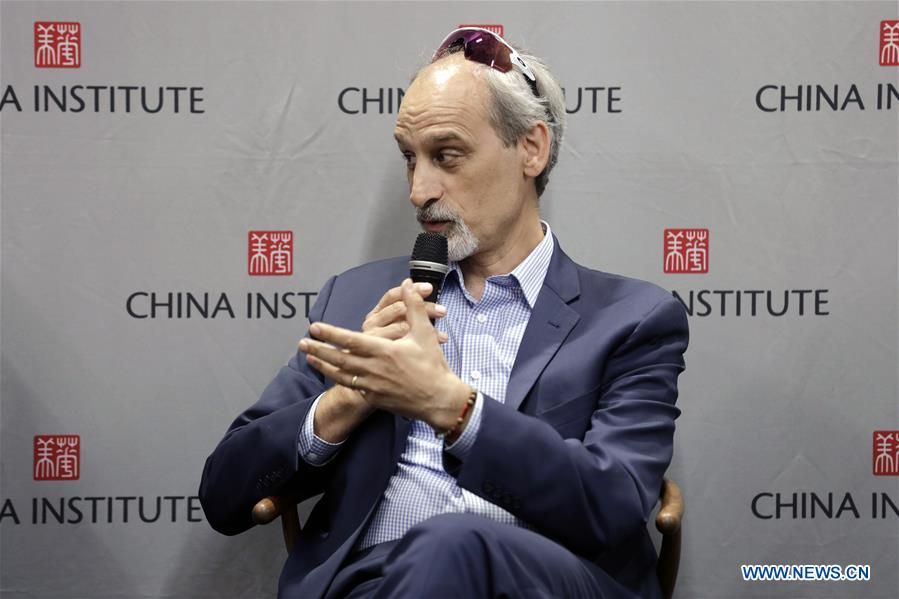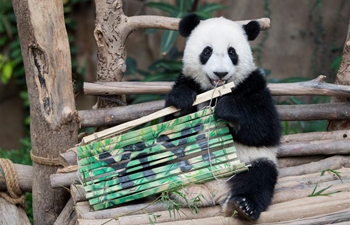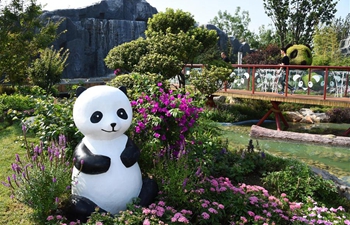
Paul Triolo, practice head of geotechnology at the political risk consultancy Eurasia Group, speaks at a panel discussion on U.S.-China competition in technology development at the China Institute in New York, the United States, Aug. 1, 2019. The United States and China should find a way to build trust and enhance communication to foster healthy competition in technology development, industry insiders have said here. (Xinhua/Li Muzi)
NEW YORK, Aug. 2 (Xinhua) -- The United States and China should find a way to build trust and enhance communication to foster healthy competition in technology development, industry insiders have said here.
The rise of technological innovation in China has to some extent driven the current U.S. administration to put technology at the front and center of its national security strategy, experts said at a panel held on Thursday at the China Institute in Lower Manhattan.
"China is now a major technology power ... so the perception is that the United States is now in a longer term struggle with China over some of the key technologies like artificial intelligence, quantum computing and 5G," said Paul Triolo, practice head of geotechnology at the political risk consultancy Eurasia Group.
The trend has been shown in the revamping of the U.S. export control system and stricter reviews of foreign investment in the United States in the past two years or so, Triolo added.
Industry insiders noted that the United States should stop making Chinese tech companies scapegoats for tensions in bilateral ties.
They agreed that it is surprising and unprecedented to see the U.S. government targeting individual Chinese companies, such as telecom giant Huawei, that have already been reliant on U.S. suppliers, as the move would ultimately hurt a lot of U.S. firms severely.
Huawei was put on an "entity list" of the Bureau of Industry and Security (BIS) of the U.S. Department of Commerce in May, which restricts the sale or transfer of U.S. technologies to the company.
Andy Purdy, chief security officer of Huawei Technologies USA, said at the panel that it's not certain how much Huawei will be negatively affected by the U.S. ban, but "the certainty is that the 11 billion (U.S.) dollars we spend every year (on purchases) from American companies could go away."
Also, some 40 rural telecom carriers in the United States and tens of thousands of rural residents would not be happy if they could no longer use Huawei equipment, which has been proved to be safe and have competitive price, Purdy pointed out.
The United States has tried to persuade its allies across the globe not to cooperate with Huawei in the building of the 5G telecom network, citing so-called security concerns including possible backdoors and data-leaking risks. However, some countries have pushed back on Washington as it can not provide any evidence of wrongdoing by Huawei, Purdy said.
The security officer noted that there has to be a comprehensive approach conforming to international standards and best practices to address risks in cyberspace.
With trade tensions going on between China and the United States, many worry that there might be a decoupling of the two economies in the technology sector. Experts rejected the view and warned of severe consequences.
China has developed mature logistic supply chains and a high-quality workforce for technology products over the last 30 years, which makes it very difficult for companies to move out of the country, they noted.
If companies leave China, "we could start paying 5,000 (dollars) for this phone," said Triolo, pointing to his own iPhone.
Even worse, the world could enter an "innovation winter" as a lot of energy and financial resources would be diverted from technological research and development. "The cumulative effect of that could be really negative," said Triolo.
To avoid this, China and the United States should find a way to build trust and enhance communication to sort out their differences, experts suggested.
"Now we have an evolving new situation and we have to find a way to have accommodation," said Purdy. "We've got to tamp down the emotions and try to talk about facts and start to build trust, one step at a time."











